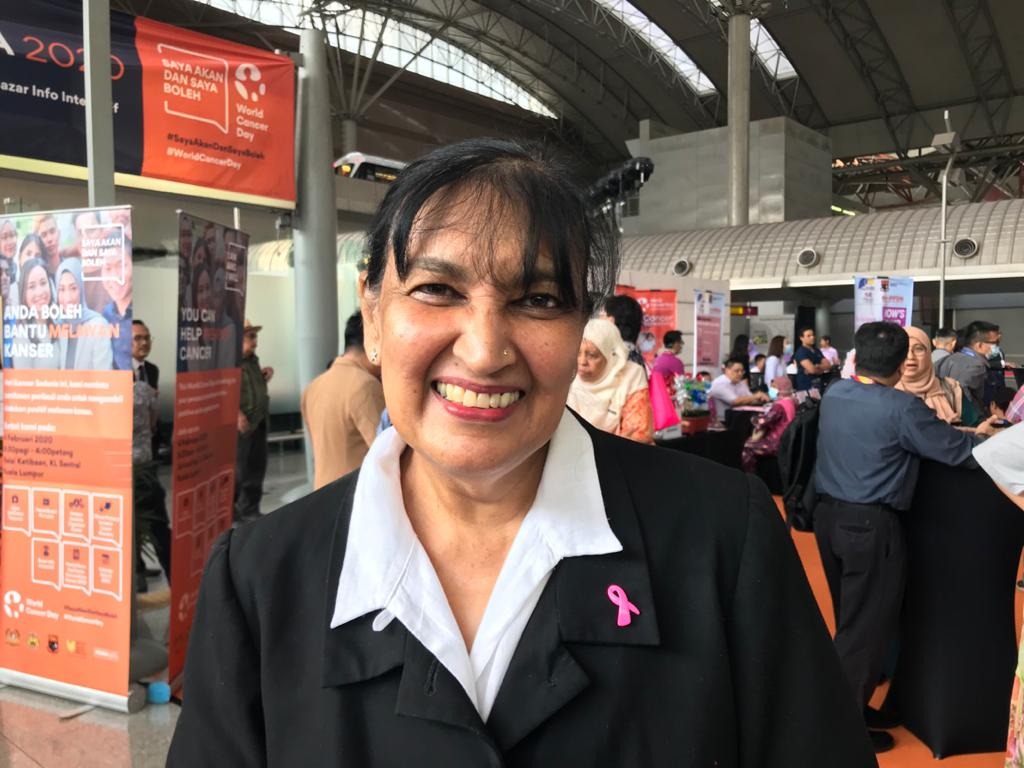KUALA LUMPUR, Feb 14 — The number of cancer deaths in Malaysia that rose in the past decade could be higher than reported, a cancer support group said.
Breast Cancer Welfare Association Malaysia president Ranjit Kaur said although there is data on deaths reported to be from cancer, the medical expertise of non-medical personnel reporting fatalities, such as police officers, is questionable.
“(The) majority who die in the village or in the house, their (cause of death is) registered by the village headman or the policeman, who has got no medical background.
“So, that patient could be having cancer (or) may have died due to complications of cancer, but (were reported as dying from) old age,” the cancer advocate said.
Speaking to CodeBlue on the sidelines of the World Cancer Day celebrations at KL Sentral last week, Ranjit also spoke of cases of deaths being reported as old age or heart attacks, but the deceased were only 40.
“If it (the reporting of their death) is by the policeman or the village headman, what is their background, expertise to be able to say their cause of death?” Ranjit asked.
The Malaysian National Cancer Registry Report (MNCRR) 2012-2016 found that nearly 30 per cent more Malaysians died from cancer in that period compared to 2007-2011, making up 82,601 medically certified and non-medically certified cancer deaths.
Medically certified deaths are certified by medical practitioners part of the Malaysian Medical Council and involves medical officers, district health officers, and coroners. Non-medically certified deaths are certified by police officers, medical assistants, and other informants.
The number of medically certified deaths gradually increased from 2012 to 2016, as were the cases from 2007 to 2011 in the previous MNCRR, but the number of non-medically certified deaths remained relatively unchanged from 2012 to 2016.
The MNCRR 2012-2016 also reported an 11 per cent increase in new cancer incidence, more late-stage detections, and a significant increase in breast cancer cases. Cancer is a manageable chronic disease in some developed countries.
Ranjit said the increases could be because more people are getting aware and presenting with symptoms of the chronic disease. Patients with cancer are only included in the Malaysian cancer registry when they see a registered doctor.
“Whether it is getting there late or early, they’re going for help,” the breast cancer survivor said, on the back of claims that the figures meant the government’s previous cancer control plan had failed.
“That could be one speculation,” she said in response. “My speculation would be more and more people are getting to know, so they’re going to the hospital.”
The public health care system could be strengthened to bridge existing gaps, she said, noting that Malaysia’s dichotomous system of government and private health care centres was problematic.
In particular, she referred to long waiting periods for diagnosis and treatment at public health care centres, which she said would drive patients to seek speedier access to diagnostic and treatment services in private hospitals instead, where treatment is more expensive.
“There’s a lot of brain drain from government to private and… due to these factors also, there is the issue of catastrophic spending that the patients face when they are facing a life-threatening disease like cancer,” Ranjit added.
“So, then they run into this double whammy, disease-progressing, money being depleted, financial toxicity or catastrophe, or disease catastrophe, which is causing end-of-life suffering as well.”
Ranjit, meanwhile, said public perception is key to seeing more people getting tested and screened for cancer, as there is currently an attitude problem among Malaysians. Education is not enough to convince them to seek screening and treatment.
“If we have more people living with the disease, not just breast cancer but other cancers, then it shows that the people will feel confident that, ‘I will go and get myself treated at an early stage’.
“Right now, everybody says it’s death. Why? Because they’re hearing more about death than life. So, we need to tip that balance to have the system in place so that we can provide the services.”
Ranjit noted that this is a problem that is specific to cancer, and not other non-communicable diseases like diabetes, for instance, to which people are generally nonchalant.
“Because they feel you can live even after diabetes. Whereas in cancer, we still don’t have that feeling that you can live after cancer treatment. So, I think it’s the attitude, people’s attitude,” she said.
“You educate them, they know about it, but they’re afraid to go. Why? Because they think that will kill them. There’s a huge psychological factor in this. It is a psycho-social factor, psychological as well as social.”







